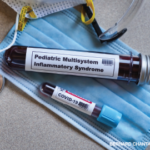Management Recommendations
 The guidance includes general recommendations, such as counseling patients and their families about public health protocols (e.g., hand washing, social distancing, wearing masks) to avoid potential exposure to SARS-CoV-2. Noting that families may be reluctant to bring their children to clinics for regular visits, Dr. Wahezi and her colleagues recommend the use of telemedicine to ensure continued access to care. The recommendations emphasize that it is equally important for physicians to continue non-rheumatic care, such as regular flu vaccinations and in-person ophthalmologic examinations if patients have a history of uveitis or are at high risk for the development of uveitis.
The guidance includes general recommendations, such as counseling patients and their families about public health protocols (e.g., hand washing, social distancing, wearing masks) to avoid potential exposure to SARS-CoV-2. Noting that families may be reluctant to bring their children to clinics for regular visits, Dr. Wahezi and her colleagues recommend the use of telemedicine to ensure continued access to care. The recommendations emphasize that it is equally important for physicians to continue non-rheumatic care, such as regular flu vaccinations and in-person ophthalmologic examinations if patients have a history of uveitis or are at high risk for the development of uveitis.
Dr. Mehta adds that during the first few weeks of the pandemic, he and his colleagues were worried their patients on immunosuppression would get very sick and require hospitalization. Although that has not happened, treatment decisions must be individualized for each patient and family, he says, noting “there’s a balance between keeping them safe and keeping them mentally healthy.” The guidance reminds providers that children and caregivers of children with pediatric rheumatic disease could be at risk of anxiety and depression due to the quarantine and other events surrounding COVID-19. Assessments for these risks should be conducted during regular visits.
Ongoing Treatment
The document also addresses ongoing treatment recommendations. For pediatric patients with rheumatic disease who have not been exposed to or infected with SARS-CoV-2, regular medication regimens should be continued, or new ones initiated, to control underlying disease. For those with stable disease who may be on stable doses of biologic or traditional synthetic disease-modifying anti-rheumatic drugs, extending laboratory testing intervals to assess for medication toxicity can be considered to reduce the risk of exposure to COVID-19.
 For pediatric patients who have close or household exposure to COVID-19, the task force had generally high levels of consensus regarding glucocorticoids. Initiation of high-dose oral or intravenous (IV) glucocorticoids should be delayed by one to two weeks, if safe, only for those patients whose rheumatic disease is non-life or organ threatening. With life- or organ-threatening manifestations, high-dose oral or IV glucocorticoids should not be delayed. Finally, the guidance stipulates specific treatment options for patients with asymptomatic or confirmed symptomatic COVID-19 infection.
For pediatric patients who have close or household exposure to COVID-19, the task force had generally high levels of consensus regarding glucocorticoids. Initiation of high-dose oral or intravenous (IV) glucocorticoids should be delayed by one to two weeks, if safe, only for those patients whose rheumatic disease is non-life or organ threatening. With life- or organ-threatening manifestations, high-dose oral or IV glucocorticoids should not be delayed. Finally, the guidance stipulates specific treatment options for patients with asymptomatic or confirmed symptomatic COVID-19 infection.
In The Bronx, Dr. Wahezi and her colleagues noted high levels of anxiety among families and providers. Nevertheless, many pediatric patients with rheumatic disease were not adversely affected by the pandemic. She sees addressing the fear and anxiety surrounding the pandemic as one of the main goals for the clinical guidance. In writing the guidance, she says, “We really wanted to drive home the message that controlling patients’ underlying disease is the most important goal, both to prevent long-term consequences related to their rheumatic disease and for reducing chances of infection.”



